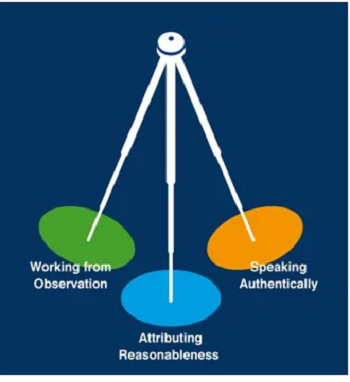Technique 1.122 Obreau Tripod
Introduction
'OBREAU" stands for observation, reasonableness and authenticity. It is used to help people get ready for challenging, difficult conversations that are not primarily technical.

With difficult conversations, some common behaviours are reacting, judging negatively and/or 'dancing around'.
The benefits of using OBREAU are
"...- Introducing a level of structure to help sort through the messiness of virtually any thorny issue
- Bringing a degree of clarity to what otherwise can seem an intractable problem
- Promoting creativity; enabling new ways to frame an issue
- Reducing the risks and threats of speaking up
- Strengthening the capacity of users to share understanding to others..."
Don Dunoon, 2022
Tripod
1. Working from Observation
Need to ask the question: 'what is correctly noticeable about this issue, topic or challenge?'
This involves putting judgements and interpretations aside.
It
"...intended as a counterpoint to the common default behaviour of reacting to new information or experience. When we react - whether by, for instance, immediately disagreeing, analysing, offering a solution or strategy - we are likely to be assuming that there is only one way of looking at this issue: your own..."
Don Dunoon, 2022
We need to realise that you see things selectively and there are other possible interpretations.
It is necessary to keep yourself open to others' points of view.
If we become judgmental, this will constrain your thinking about the range of possibilities.
2. Attributing Reasonableness
You need to understand where others are coming from, ie assume that they
"...act as reasonable people who have a way of interpreting events and experience that makes sense to them..."
Don Dunoon, 2022
Focus on their
- assumptions (what they might take as given, for granted, etc)
- interests (what they might value, want to advance or protect)
- feelings (what emotions they might be experiencing)
- knowledge (what insights or experience they might have which are yet to be stated)
Furthermore, reasonableness helps you test your interpretation which includes your own understated assumptions, feelings and knowledge; you are aware of your own mindsets, including the role of conscious and unconscious bias.
Part of this involves sympathy and empathy.
NB Attributing reasonableness
"...is to help us break away from the usual default pattern of judging others negatively and not testing our own interpretation......enables us to enrich our appreciation of what might be occurring with a particular issue and to do so in a way that we can validate with others..."
Don Dunoon, 2022
3. Speaking Authentically
This means you speak truthfully and this approach connects with observation and reasonableness. This should reduce the default behaviour of 'dancing around', ie
"...speaking in euphemisms, avoiding or sugar-coating the difficult topics, and holding back from what we would like to say..."
Don Dunoon, 2022
It is not
"...a matter of 'unloading' onto others; telling them how you really think and feel even if that means sharply criticising them. Doing so is unlikely to help in opening up conversations and building shared meaning..."
Don Dunoon, 2022
Some ways to handle
"...- identify a neutral way of introducing the topic
- think of possible questions you might ask which reflect observation and reasonableness and on which you are generally interested in hearing others' views
- identify what else you might say, that is true for you and sits with your observation and reasonableness..."
Don Dunoon, 2022
This approach is aiming to develop a common understanding on a challenging issue by communicating in a way in which others are likely to share their thoughts and feelings, without being unduly concerned about ulterior motives or hidden agendas
Summary
1. Working from Observation (aim is to avoid reacting and locking in prematurely to a particular interpretation and analysis; it provides a relatively low-risk way to contribute to a conversation and remain open to possibilities.)
2. Attributing Reasonableness (aim is to lower your attachment to the one's default position; need to consider yours and others' possible unspoken assumptions, biases, interests, feelings, knowledge, etc; assume that people are all acting reasonably; chance to explore potential alternatives.)
3. Speaking Authentically (identify what is real for you about the issue after reflective observation and attributing reasonableness to others; need to be careful that you do not revert to default patterns of reacting negatively judging others, dancing around the issue, etc)
NB
"...you're preparing for a conversation: thinking about what you might say depending how the interaction unfolds. You're not writing a script. Yet having primed yourself for the conversation......you are potentially well-placed to explore an issue in ways that bring new insights and point to a way forward..."
Don Dunoon, 2022
